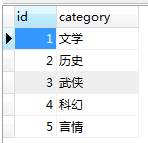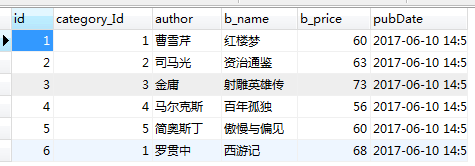Hql, Hibernate Query Language, is an object-oriented query language, which is based on objects, not tables and fields in the database.
1. Preparation
Firstly, there are two classes: TBook class and Category class. There is a many-to-one relationship between them.
Two classes correspond to two tables. Let's save some data first.
@Test
public void save() {
Session session = null;
Transaction tran = null;
try {
session = SessionUtil.getSession();
tran = session.beginTransaction();
Category c1 = new Category();
c1.setCategory("literature");
Category c2 = new Category();
c2.setCategory("History");
Category c3 = new Category();
c3.setCategory("Knight errant");
Category c4 = new Category();
c4.setCategory("science fiction");
Category c5 = new Category();
c5.setCategory("Romance");
TBook book1 = new TBook();
book1.setBName("The Dream of Red Mansion");
book1.setAuthor("Cao Xueqin");
book1.setBPrice(60);
book1.setPubDate(new Date());
book1.setCategory(c1);
TBook book2 = new TBook();
book2.setBName("Comprehensive Mirror for Aid Government");
book2.setAuthor("author of the history Zizhi Tongjian");
book2.setBPrice(63);
book2.setPubDate(new Date());
book2.setCategory(c2);
TBook book3 = new TBook();
book3.setBName("Heroic Biography of Archery");
book3.setAuthor("Jin Yong");
book3.setBPrice(73);
book3.setPubDate(new Date());
book3.setCategory(c3);
TBook book4 = new TBook();
book4.setBName("Hundred Years of Loneliness");
book4.setAuthor("Gabriel Garcia Marquez");
book4.setBPrice(56);
book4.setPubDate(new Date());
book4.setCategory(c4);
TBook book5 = new TBook();
book5.setBName("Pride and Prejudice");
book5.setAuthor("jane austen");
book5.setBPrice(60);
book5.setPubDate(new Date());
book5.setCategory(c5);
TBook book6 = new TBook();
book6.setBName("Journey to the West");
book6.setAuthor("Luo Guanzhong");
book6.setBPrice(68);
book6.setPubDate(new Date());
book6.setCategory(c1);
session.save(book1);
session.save(book2);
session.save(book3);
session.save(book4);
session.save(book5);
session.save(book6);
tran.commit();
} catch (Exception ex) {
ex.printStackTrace();
} finally {
session.close();
}
}Detailed data in the table


2. Hql query
2.1. Query for a single attribute
@Test
public void query1(){
Session session = null;
try {
session = SessionUtil.getSession();
List<String> list = session.createQuery("select BName from TBook").list();
for (String name : list) {
System.out.println(name);
}
} catch (Exception e) {
e.printStackTrace();
}finally{
SessionUtil.close(session);
}
}The Dream of Red Mansion Comprehensive Mirror for Aid Government Heroic Biography of Archery Hundred Years of Loneliness Pride and Prejudice Journey to the West
2.2. Queries returning multiple attributes
@Test
public void query2(){
Session session = null;
try {
session = SessionUtil.getSession();
List<Object[]> list = session.createQuery("select BName,BPrice from TBook")
.list();
for(Object[] book : list){
System.out.println("Title:"+book[0]+"\t\t Price:"+book[1]);
}
} catch (Exception e) {
e.printStackTrace();
}finally{
SessionUtil.close(session);
}
}Title: Dream of Red Mansions Price: 60 Title: Zizhi Tongjian Price: 63 Title: Heroes of Archery Price: 73 Title: Centennial Loneliness Price: 56 Title: Pride and Prejudice Price: 60 Title: Journey to the West Price: 68
Note that when querying multiple attributes, the query results in a collection of object data.
Another way
@Test
public void query3(){
Session session = null;
try {
session = SessionUtil.getSession();
List<TBook> list = session.createQuery("select new TBook(BName,BPrice) from TBook").list();
for(TBook book : list){
System.out.println(book.getBName()+"---"+book.getBPrice());
}
} catch (Exception e) {
e.printStackTrace();
}finally{
SessionUtil.close(session);
}
}Since new TBook(BName,BPrice) is used in Hql, there must be such a constructor in your pojo class.
2.3. Query all attributes
@Test
public void query3(){
Session session = null;
try {
session = SessionUtil.getSession();
List<TBook> list = session.createQuery("from TBook").list();
for(TBook book : list){
System.out.println(book);
}
} catch (Exception e) {
e.printStackTrace();
}finally{
SessionUtil.close(session);
}
}TBook [id=1, author = Cao Xueqin, BName = Dream of Red Mansions, BPrice=60, pubDate=2017-06-10 14:51:57.0] TBook [id=2, author = Sima Guang, BName = Zizhi Tongjian, BPrice=63, pubDate=2017-06-10 14:51:57.0] TBook [id=3, author = Jinyong, BName = Heroes of Archery, BPrice=73, pubDate=2017-06-10 14:51:57.0] TBook [id=4, author = Marquez, BName = 100 years of loneliness, BPrice=56, pubDate=2017-06-10 14:51:57.0] TBook [id=5, author = Jane Austen, BName = pride and prejudice, BPrice = 60, pubDate = 2017-06-104:51:57.0] TBook [id=6, author = Luo Guanzhong, BName = Journey to the West, BPrice=68, pubDate=2017-06-10 14:51:57.0]
Where hql can also be written in full, using an alias, that is, select t from TBook t
2.4. Splicing Query Statement of Conditional Query
@Test
public void query4(){
Session session = null;
try {
session = SessionUtil.getSession();
List<TBook> list = session.createQuery("from TBook where id<"+4).list();
for(TBook book : list){
System.out.println(book); }
} catch (Exception e) {
e.printStackTrace();
}finally{
SessionUtil.close(session);
}
}2.5. Placeholder Mode of Conditional Query
@Test
public void query5(){
Session session = null;
try {
session = SessionUtil.getSession();
List<TBook> list = session.createQuery("from TBook where id<?")
.setInteger(0,3).list();
for(TBook book : list){
System.out.println(book);
}
} catch (Exception e) {
e.printStackTrace();
}finally{
SessionUtil.close(session);
}
}Note that the table below starts at 0.
Thereafter, the query results are no longer listed.
2.6. Alias-based queries for conditional queries
@Test
public void query6(){
Session session = null;
try {
session = SessionUtil.getSession();
List<TBook> list = session.createQuery("from TBook where id<:id")
.setParameter("id",4).list();
for(TBook book : list){
System.out.println(book);
}
} catch (Exception e) {
e.printStackTrace();
}finally{
SessionUtil.close(session);
}
}2.7. Paging query
Just set the starting position and the maximum number of query data. Note that the setting of the starting position is not included.
@Test
public void query7(){
Session session = null;
try {
session = SessionUtil.getSession();
List<TBook> list = session.createQuery("from TBook")
.setFirstResult(0).setMaxResults(4).list();
for(TBook book : list){
System.out.println(book);
}
} catch (Exception e) {
e.printStackTrace();
}finally{
SessionUtil.close(session);
}
}Result:
TBook [id=1, author = Cao Xueqin, BName = Dream of Red Mansions, BPrice=60, pubDate=2017-06-10 14:51:57.0] TBook [id=2, author = Sima Guang, BName = Zizhi Tongjian, BPrice=63, pubDate=2017-06-10 14:51:57.0] TBook [id=3, author = Jinyong, BName = Heroes of Archery, BPrice=73, pubDate=2017-06-10 14:51:57.0] TBook [id=4, author = Marquez, BName = 100 years of loneliness, BPrice=56, pubDate=2017-06-10 14:51:57.0]
2.8. count of aggregated queries
@Test
public void query8(){
Session session = null;
try {
session = SessionUtil.getSession();
//Object count = session.createQuery("select count(*) from TBook").uniqueResult();
Number count = (Number)session.createQuery("select count(*) from TBook").uniqueResult();
System.out.println(count.intValue());
} catch (Exception e) {
e.printStackTrace();
}finally{
SessionUtil.close(session);
}
}2.9. avg of aggregated queries
@Test
public void query9(){
Session session = null;
try {
session = SessionUtil.getSession();
Number priceavg = (Number)session.createQuery("select avg(BPrice) from TBook").uniqueResult();
System.out.println(priceavg.doubleValue());
} catch (Exception e) {
e.printStackTrace();
}finally{
SessionUtil.close(session);
}
}2.10. Sort Query
@Test
public void query10(){
Session session = null;
try {
session = SessionUtil.getSession();
List<TBook> list = session.createQuery("from TBook order by BPrice").list();
for(TBook book : list){
System.out.println(book);
}
} catch (Exception e) {
e.printStackTrace();
}finally{
SessionUtil.close(session);
}
}Result:
TBook [id=4, author = Marquez, BName = 100 years of loneliness, BPrice=56, pubDate=2017-06-10 14:51:57.0] TBook [id=1, author = Cao Xueqin, BName = Dream of Red Mansions, BPrice=60, pubDate=2017-06-10 14:51:57.0] TBook [id=5, author = Jane Austen, BName = pride and prejudice, BPrice = 60, pubDate = 2017-06-104:51:57.0] TBook [id=2, author = Sima Guang, BName = Zizhi Tongjian, BPrice=63, pubDate=2017-06-10 14:51:57.0] TBook [id=6, author = Luo Guanzhong, BName = Journey to the West, BPrice=68, pubDate=2017-06-10 14:51:57.0] TBook [id=3, author = Jinyong, BName = Heroes of Archery, BPrice=73, pubDate=2017-06-10 14:51:57.0]
2.11. Group Query
@Test
public void query11(){
Session session = null;
try {
session = SessionUtil.getSession();
List<Object[]> list = session.createQuery("select t.category.category,count(t.BName) from TBook t "
+ "group by t.category.category").list();
for (Object[] book : list) {
System.out.println(book[0]+"-----"+book[1]);
}
} catch (Exception e) {
e.printStackTrace();
}finally{
SessionUtil.close(session);
}
}Result:
History - - - 1 Literature - - - 2 Knight-errant - - - 1 Science Fiction - - - 1 Love - - - 1